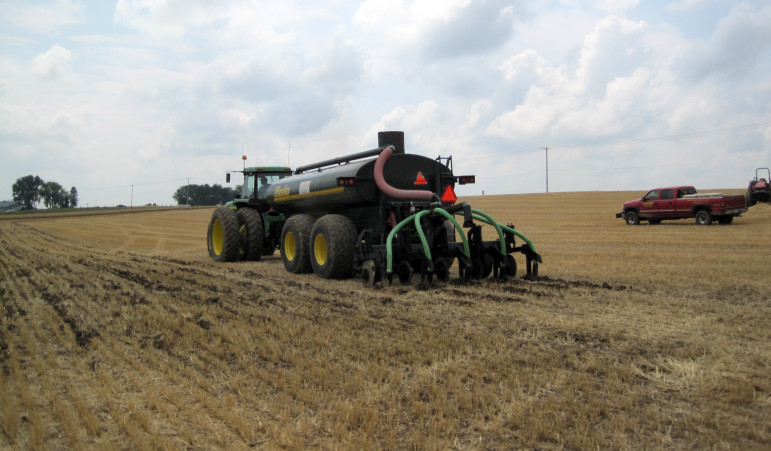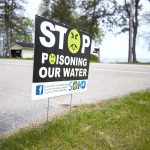Farm Bureau Has Capitol Clout
Spends $3 million on lobbying alone, gets policies hurting environment.

Manure is spread during a demonstration at Crave Brothers Farm in Dodge County during Farm Technology Days on July 22, 2009. Manure from large dairy operations has caused drinking water contamination in Brown and Kewaunee counties in recent years. Photo by Carolyn Betz of the University of Wisconsin Sea Grant Institute.
The Wisconsin Farm Bureau Federation is the state’s largest agriculture organization and a lobbying heavyweight on farm, tax, environmental, and other policy and spending issues that affect the state’s agriculture industry.
To that end, the Federation was among a cadre of powerful special interests who are backing controversial GOP bills that were resurrected from the last legislative session to loosen state permitting and oversight of high-capacity wells.
The measures, Assembly Bill 105 and Senate Bill 76, would eliminate state reviews of existing permits for any high-capacity wells when they are repaired, replaced, or sold in real estate transactions. High-capacity wells allow users, which include large farms, food processors, and frac-sand mining operations, to pump up to 100,000 gallons of water a day for irrigation and other needs.
Environmentalists and others say the high-capacity wells have caused some rivers, lakes, and streams around the state to shrink or even dry up during the summer, damaging fish, wildlife, and their habitat.
The Federation also supported a plan announced late last year to reorganize the Department of Natural Resources and privatize some of the work on state permits for manure spreading on large factory farms. In February, Republican Gov. Scott Walker included some of those plans in his proposed 2017-19 state budget. The legislature will spend the next few months considering and revising Walker’s proposed budget before sending it back to him later this summer for final approval.
During the 2015-16 legislative session several bills sought by the Federation became law, including relaxed weight and size limits on agricultural vehicles and other vehicles that haul crops, reduced food processing plant licensing requirements for dairy products, expanded licensing and fee exemptions to include ready-to-eat food processors; and a prohibition on local inspection rules for livestock and poultry slaughtering and processing operations.
The group’s lobbying operation is augmented by campaign contributions and outside election spending, mostly to support Republicans or conservatives for statewide office and the legislature. Since 2000, the Federation has spent more than $1.3 million on outside electioneering activities, like radio and newspaper ads, and about $306,000 on direct contributions to candidates.
The federation’s campaign contributions and outside election spending are handled by its political action committee, Volunteers for Agriculture.
The candidates who received top support from the federation’s outside electioneering activities were Walker, about $213,450; GOP Sen. Sheila Harsdorf, of River Falls, about $178,135; and Republican Rep. Kathy Bernier, of Lake Hallie, about $71,320.
The PAC’s top direct contributions flow to the politically powerful – the governor and legislative campaign committees used by leaders to raise money from special interests to spend on elections. Legislative leaders control the fate of bills long before they reach the governor’s desk for a decision. The top recipients of direct contributions by the Federation’s PAC since 2000 were:
Walker, $65,500;
Republican Assembly Campaign Committee, $42,300;
Committee to Elect a Republican Senate, $42,000;
Assembly Democratic Campaign Committee, $16,750;
State Senate Democratic Committee, $5,900.
But the Federation’s political activities have not come without problems. In 2014, the Federation reached a settlement with the now-defunct Government Accountability Board (GAB) for making illegal corporate contributions to its PAC. The GAB said the group had partly funded its Volunteers for Agriculture PAC with $4,152 in contributions from individuals who contributed from their business accounts, rather than making personal contributions.
Rather than pay a standard fine to the GAB for the violation, the federation was allowed to make a $4,152 charitable donation to its own charity, the Wisconsin Farm Bureau Foundation.
Campaign Cash
-
Outside Groups Spent Record $28.8 Million on State Supreme Court Race
 May 7th, 2023 by Erik Gunn
May 7th, 2023 by Erik Gunn
-
Top 20 Donors to State Political Parties
 Apr 4th, 2023 by Peter Cameron and Hina Suzuki
Apr 4th, 2023 by Peter Cameron and Hina Suzuki
-
$38 Million Spent on High Court Race
 Mar 29th, 2023 by Erik Gunn
Mar 29th, 2023 by Erik Gunn

















Calling agribusiness farming is like calling Wrestlemania a sporting event.